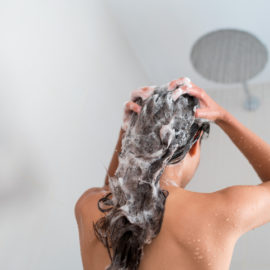Blemishes or acne are related to excess oil or sebum, produced by sebocytes cells in the skin. For young people particularly, blemishes are a common skin concern. As a result, a huge proportion of beauty and skin care products marketed at Generation Z – that is, teenagers and young people born in the mid- to late-nineties – have some sort of skin-clearing or anti-sebum claim. As of this year, Grandview Research estimates the size of the global anti-acne market is $2.37 billion, with a compound annual growth rate of 8.2% over the next five years.
Now more than ever, teens use the digital world to project an idealized vision of themselves: on average, almost a third of all 18 to 24-year-olds log on to the social network TikTok multiple times a day. Oily skin and acne are known to have a detrimental effect on self-esteem, and considering the pressures that today’s teens face, it’s no wonder they are concerned that their skin is glowing and blemish-free.
In a culture where young people feel constantly seen, they have a tendency to be more worried about their appearance than generations before them. However, it would be naive to cast Gen Z as shallow or image-obsessed; in fact, they particularly value ethics and sustainability. Certainly, young people want their skin to be flawless – but they want their skin care to be as ethical as it is effective.
Content
Gen Z and ethical beauty
Last year, 67% of Gen Z reported that they would stop buying beauty brands that used unethical practices. A further 58% said they always look for products that are environmentally friendly and 55% only use cruelty-free products (Mintel, 2019). This tendency towards ethical beauty is certainly pronounced and major brands have responded, recruiting popular celebrities and activists as brand ambassadors.
However, Gen Z’s overwhelming preference for ethical beauty and social media aren’t mutually exclusive; in fact, they go hand in hand. According to the same Mintel study, 28% of Gen Z who use beauty and grooming products would call out brands they think are unethical on social media.
Subsequently, brands that want to engage with Gen Z consumers need to meet them where they are. Whereas older consumers might be more influenced by traditional advertising, Gen Z turns to their social circles and favorite public personalities for advice. This is why major brands have signed ambassadors such as singer Zendaya, who is known for being vocal about race and social issues. Her public profile appeals to Gen Z consumers, as they feel she upholds their values and concerns.
Natural anti-sebum cream and treatments
Oily skin and acne are linked to an excess of sebum, and to control breakouts, consumers look for anti-sebum products. However, the anti-sebum market is transforming. Savvier, environmentally-conscious Gen Z consumers don’t want astringent, harsh chemicals on their skin. Instead, they want to be flawless naturally, with sustainable, clean ingredients.
This is why Provital developed Nelupure™. Harnessing the calming power of lotus flowers, this powerful active regulates sebum production combining nature and science. It has been shown that leptin – a protein synthesized and secreted by various cell types in our skin – plays a key role in sebum synthesis (Poeggeler et al., 2009). Leptin stimulates the expression of inflammatory agents in sebocytes, which are the cells responsible for the secretion of sebum. This can lead to an unwanted shiny finish or breakouts (Törőcsik et al., 2014).
For the first time in cosmetics, Provital has synthesized a mechanism based on leptin-receptor inhibition to regulate sebum. Nelupure™ reduces the expression of the leptin cellular receptor in sebocytes, preventing it from triggering sebum production and inflammatory reaction that cause skin blemishes. The result is an instantly glowing, clear, selfie-ready complexion. And because we know beauty needs to be inclusive, we have verified the results on several skin pigmentation profiles.
Natural, sustainable, inclusive
To Gen Z, image is everything – but ethics are too. Gen Z are key consumers of anti-sebum and skin clearing products, so to appeal to this increasingly powerful segment, brands need to demonstrate they know beauty isn’t skin deep. According to Mintel’s study, 49% of Gen Z consumers always look for natural or organic products, perceiving them to be kinder and more environmentally-friendly. In response, beauty brands should shelve harsh chemicals and look to nature to treat Gen Z’s number one skin concern. The bar may be high, but with innovations like Nelupure™, the industry can develop skin care that’s effective and ethical.
No comments yet
There are no comments on this post yet.






Leave a comment